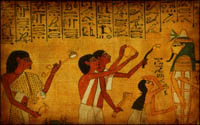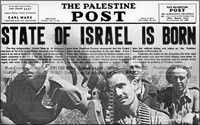 Understanding ancient Egypt is important to grasping the backdrop of the Bible
Understanding ancient Egypt is important to grasping the backdrop of the Bible
Egypt was the exception to the rule in the ancient world in the sense that it was fully self-sufficient. All the other countries in the Near East and Mesopotamia were dependent upon war, trade or expansion of the economy to feed themselves. Egypt was the exception. Its economy was fully self-sufficient.
During the years of the great famine Egypt was able to withstand the brunt of it, albeit with proper foresight and planning implemented by Joseph, because it was so self-sufficient. It was even able to export grain while the rest of the civilized world could not even produce enough for its own people.
The Great Nile
Egypt’s self-sufficiency and wealth can be traced to one source: the Nile River. Over the centuries, flooding from the Nile deposited layer upon layer of mud that became rich, fertile earth, which could grow more than enough to adequately support its population.
The Nile River ran for hundreds of miles all the way from what would become Alexandria in the north to what is today the Sudan in the south. It was the center of a narrow belt of extremely fertile land. If you went beyond fifteen to twenty-five miles on either side of the Nile you came to what the Egyptians called “black dirt,” which meant the desert.
All Egypt’s ancient cities were built along the Nile. It was literally the life blood of their civilization. When the Moses described the land of Canaan to the Jewish people who were about to enter it he told that that it will not be like Egypt, which has the Nile, and therefore has a steady supply of water. Rather, he told them, you are coming to a land where you will depend upon rainfall. You will, therefore, have to rely on God (Deuteronomy 11:10-12).
The Egyptians did not rely on God – or at least did not think they had to rely on God. They relied on the Nile. In fact, the Nile was their god. True, once in a while it flooded and carried away ten to fifteen thousand Egyptians. However, that was acceptable because the flood also laid down a whole new layer of topsoil, expanded the valley and provided even more water.
The Nile also provided transportation. Ancient Egyptians did not rely upon wheeled traffic, including camels and donkeys, which were so common in biblical times and were necessities in places like Canaan, Babylon and Mesopotamia. The Nile was Egypt’s own, unique superhighway. This was another reason ancient Egypt achieved commercial success. Its goods were easily transportable. Trade did not suffer from the obstacles land-based economies endured.
The river also provided reeds. In the ancient world the reeds were used for many things – including everything from building materials to utensils like knives. Most of all, though, reeds were used to manufacture papyrus, the paper of its day.
The Mesopotamians wrote upon clay tablets, which are very bulky. Imagine carrying the Encyclopedia Britannica on clay tablets. The Egyptians were able to develop a culture and method of conducting commerce beyond anything else in its time simply because they had papyrus to serve as paper.
Whereas most of the other civilizations of the ancient world had cultures based upon oral transmissions Egypt’s was based more upon writing than the others. This is probably why today we have a more extensive record of Egypt than any ancient civilization.
The Three Kingdoms
Ancient Egypt is divided into three epochs: the Old Kingdom, the Middle Kingdom and the New Empire. These are relatively arbitrary divisions made by modern-day historians to enable us to better deal with what amounts to 1,400 years of history.
The Old Kingdom began about 4,500 years ago. Its origin coincides with the time just after the Flood, and consisted of about twenty-five kings spanning about 500 years, which is not a great number of kings for such a long period. This suggests a great deal of stability in the country.
The Old Kingdom felt protect by their natural buffer in the north: the Sinai desert.[1] Most of problems they had were with the tribes to the south, the Sudan, as well as from the west, from the tribes in Libya.
Because it was so well insulated, the Old Kingdom was not notoriously expansionist or imperialistic – at least militarily. Economically, though, they were very aggressive. Egypt dominated the Middle East for centuries with their wealth, not with invading armies.
The Middle Kingdom
The end of the Old Kingdom coincided with an invasion of Egypt by a people called the Hyksos. Many secular historians have attempted to compare or identify the Hyksos with the Hebrews. However, there is no indication of this in Jewish tradition.
What we do know is that the Hyksos were an alien culture. Relatively suddenly after their ascension they disappeared from the pages of history. We do not know exactly how. Apparently, there was a rebellion and they were destroyed by the local, indigenous population. Their demise marked the beginning of the New Empire.
The New Empire
The New Empire Egyptians not only expelled the Hyksos, but all aliens. They were xenophobic, narrow, and provincial and lacked all tolerance of foreigners. Aliens whom they did not expel were enslaved. Not surprisingly, then, it was under the New Empire that the enslavement of the Jewish people occurred.
Of course, they were by no means the only enslaved people in Egypt. Everyone not Egyptian was considered inferior; their purpose was to be enslaved and exploited. That is why when the Jews left Egypt a “mixed multitude” went out with them (Exodus 12:38). These were groups of other peoples who were also enslaved.
The New Empire brought along with it a new type of Pharaoh. They were a breed of aggressive, forceful, warrior-like personalities who at the same time were able administrators. They were not satisfied with the wealth of Egypt and that the whole world came to them. They wanted to take over the whole world. They were the first great imperialists. That is why it is called the New Empire. The other ones were called Kingdoms.
Egypt at this time conquered all of Canaan and most of Mesopotamia. Their influence even spread to the Phoenician cities to the north. Phoenician traders could only operate with the consent and guidance of the Pharaoh. Archeologists have found in Lebanon vast treasures of Egyptian markings and rules of trade. They were under Egyptian domination.
Empires existed before Egypt, but they were small city-states. If one city-state defeated another in a war they usually burned the entire city. They did not want to convert the defeated city into one of their own because they did not have the manpower or imperial governing infrastructure. Not so the Egyptians. When they came they stayed. They colonized all of their conquests. That is the idea of empire.
The Slave Society
The last point to keep in mind about the New Empire is the conversion of Egypt into a slave society. In the ancient world slavery was not only an institution, but a necessary institution. It was the only way the country could run.
All slave societies eventually collapse from a combination economic sabotage, sloth and inefficiency. The Roman Empire was undone by slavery. The South in the United States was undone by slavery. Egypt would be no different. However, it would take many centuries before it would become evident.
Employing vast armies of enslaved peoples, Egypt undertook massive building projects. We only see a portion of what remains thousands of years later. Even today we do not fully understand how objects like the pyramids were built. How did they move impossibly heavy stones over significant distances with the tools they had? It is a mystery. However, if you have 50,000 slaves it becomes a bit more conceivable.
We also have to understand the mentality that went along with the slave society. Human life was the cost of doing business. If 10,000 slaves had to die in the process of a great building project so be it. Egypt now looked at everyone else as grist for its mill. They sought people who could be brought into Egypt and enslaved.
Consequently, when Joseph and his brothers arrived in Egypt they came to a fearsome situation. It was not the benign Egypt in the time of Abraham, who could talk to Pharaoh face-to-face and even tell him he was wrong. The circumstances of Joseph’s introduction to Pharaoh – the miraculous and prophetic way he interpreted his dreams – allowed him to speak to him face-to-face too. However, if not for that the experience of a small clan of brothers coming to Egypt would not have been pleasant. And as fearsome as the Egypt was that Joseph and his brothers came to it will be no comparison of the Egypt a century later, which will enslave the Jewish people.
[1] Many archaeologists believe that the northern gate of this kingdom was in Gaza, which was originally controlled by the Egyptians before the invasion of the Philistines. Others think it was at El Arish, about a third of the way into the Sinai desert, where the only river there that flows into the Mediterranean exists. In the Bible it is called, Nachal Mitzrayim, the “River of Egypt” (e.g. Joshua 15:4, 47; I Kings 5:65; Isaiah 27:12).











